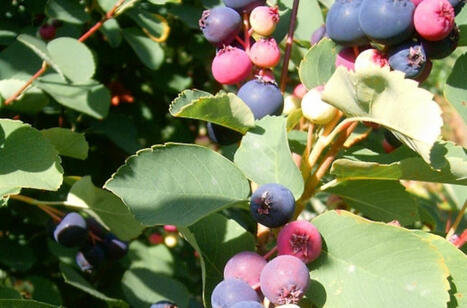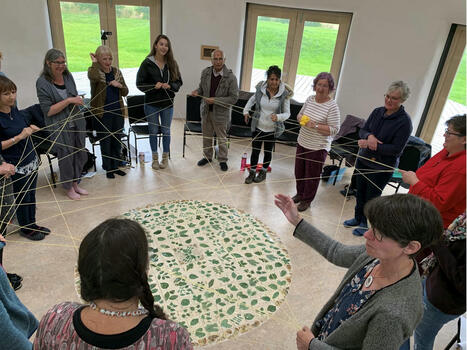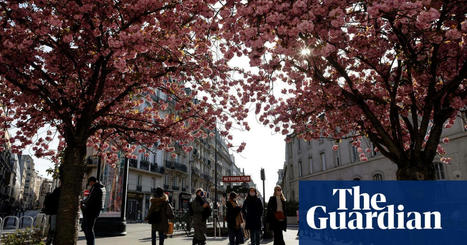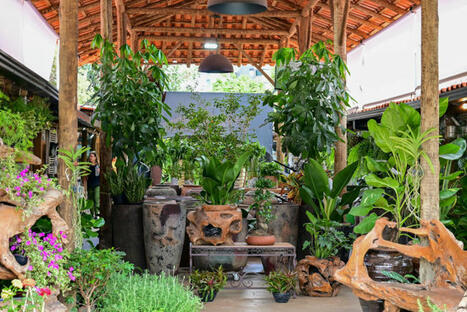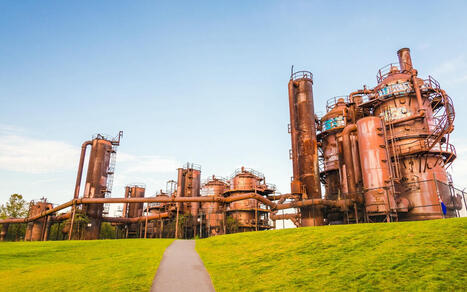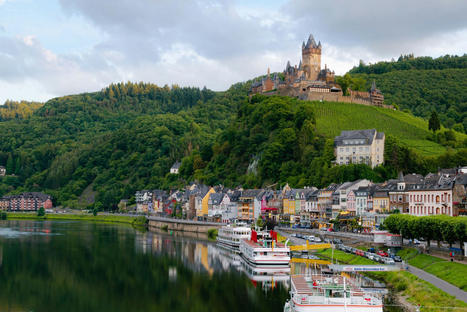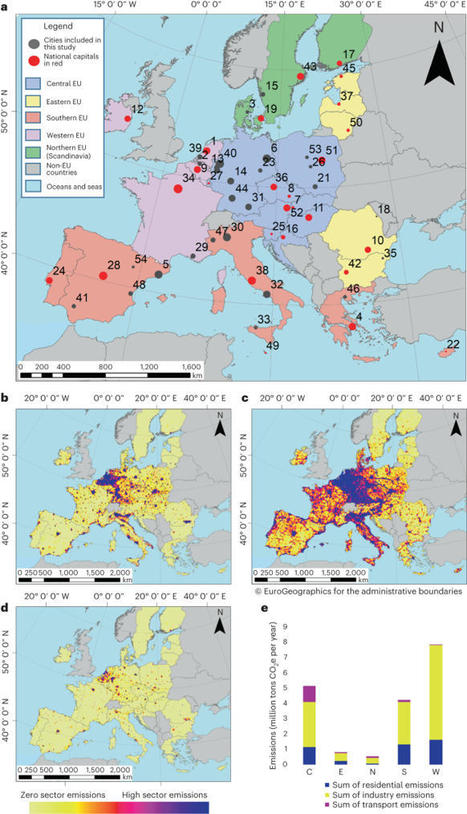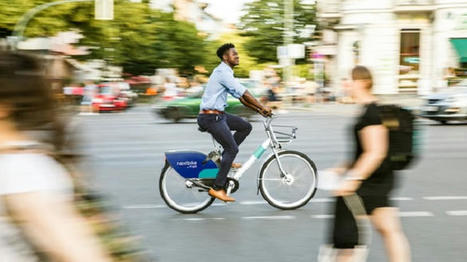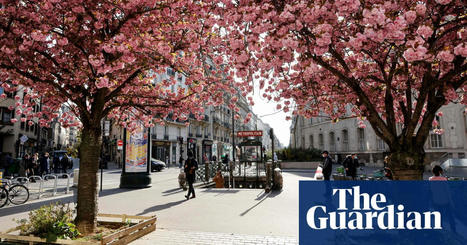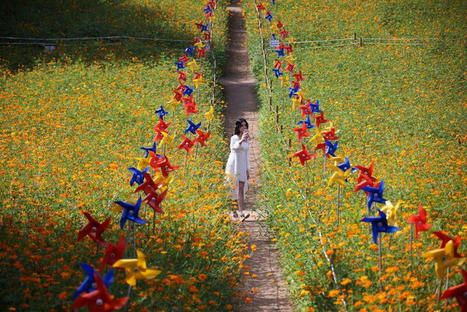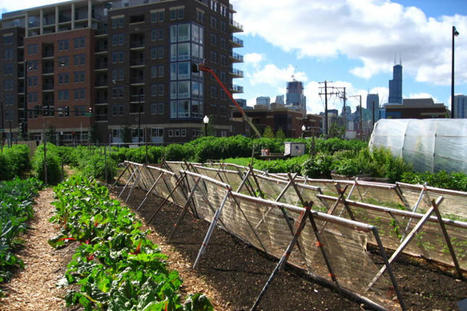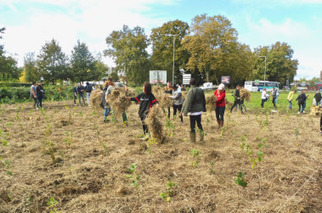 Your new post is loading...

|
Scooped by
Energy Cities
July 10, 11:01 AM
|
This article provides a brief description of what complete neighbourhoods are and it analyses the actions taken by the ReGreeneration cities to promote urban proximity, focusing on soft mobility and basic services provision.

|
Scooped by
Energy Cities
March 27, 10:37 AM
|
A new study on Sweden’s largest sustainable urban development project finds that individual Nature-based solutions (NbS) have minimal impact on local climate, emphasizing the need for large-scale, interconnected green infrastructure for substantial cooling.
The research, carried out in Stockholm Royal Seaport, utilized a network of wireless sensor stations to monitor real-time temperature variations across different types of NbS: forest parks, green courtyards, rain gardens, green roofs, and lawns.

|
Scooped by
Energy Cities
November 27, 2024 5:03 AM
|
Ultimately, The Serviceberry is a hopeful book. It offers a way out of what Kimmerer calls a “cannibal economy”, where endless consumption depletes the world around us. Instead, she imagines a system where resources circulate through communities, creating webs of independence that nourish both humans and nature.

|
Scooped by
Energy Cities
August 20, 2024 9:59 AM
|
Natural principles are a core part of regenerative practices. They are seen in permaculture, biomimicry, biophilic design, systems-thinking, regenerative leadership, regenerative economics, ancient and indigenous wisdom.

|
Scooped by
Energy Cities
October 30, 2023 11:04 AM
|
Part of the Croatian Greenway long-distance cycling path, passing by Zagreb, has been completed with environmentally friendly eco-asphalt. This is the first time the road material has been used in tha..

|
Scooped by
Energy Cities
September 12, 2023 4:08 AM
|
Parks, trees, green roofs and gardens are what scientists call nature-based solutions to cooling overheated cities. Then there are the technical solutions, solar panels, heat pumps and other ways of cutting fossil fuel use. But even all these combined are not enough to reach the goal of net zero carbon emissions.

|
Scooped by
Energy Cities
February 8, 2023 2:21 AM
|
Recovering urban wildlife isn’t just about protecting a city’s parks and rivers, but also making its streets, homes and skyscrapers greener.

|
Scooped by
Energy Cities
September 28, 2022 4:32 AM
|
New public buildings in Finland have to incorporate more wood, which is leading builders to innovate.

|
Scooped by
Energy Cities
May 23, 2022 6:00 AM
|
The framing of nature as separate from culture impacts our notion of landscapes and the functions, infrastructures and activities deemed appropriate within these, where natural landscapes are associated with nature conservation, and the built environment with human activity. In this paper, we propose bridging this nature–society dichotomy through a multifunctional perspective as a way to adopt a more systemic view of space in relation to landscape traits as well as material artefacts.

|
Scooped by
Energy Cities
January 11, 2022 4:51 AM
|
Rotterdam launched an innovative pilot project: QR codes were placed on some 100 trees that are declining and therefore need to be removed.

|
Scooped by
Energy Cities
November 4, 2021 1:14 PM
|
Vienna received the European City of Trees award (ECOT) from the European Arboricultural Council, acknowledging the Austrian capital as a model for care in the domain of urban greenery. The Arboricultural Council also pointed to the city’s innovative knowledge-based approach for the improved adaptability of the urban environment in the face of climate change. They also held up Vienna as an outstanding example of good practices that other European cities can emulate.

|
Scooped by
Energy Cities
August 17, 2021 9:02 AM
|
Water is becoming more important as a resource, as European cities implement an increasing number of green programmes

|
Scooped by
Energy Cities
July 27, 2021 8:26 AM
|
This brief introduces a four-part series exploring nature-based solutions (NbS). Responding to identified gaps in existing knowledge about the social and economic sustainability aspects of NbS, the series seeks to explore their costs and benefits and how they can be developed without leaving anyone behind.
|

|
Scooped by
Energy Cities
May 14, 10:40 AM
|
For centuries, humans have tried to tame nature. The result: neatly trimmed parks, orderly gardens, and manicured green spaces. But a shift is underway. Across the world, a new approach to landscape design is gaining ground — one that places nature in control. This emerging design ethos champions wildness, inviting ecosystems to flourish on their own terms. Are we entering the age of rewilding?

|
Scooped by
Energy Cities
December 4, 2024 4:46 AM
|
Most big-think essays like this end on a note of inspiration and hope. For once, I’ll resist the temptation to go that route. Can we humans make ourselves useful to the rest of life? It’s an open question.

|
Scooped by
Energy Cities
November 27, 2024 4:40 AM
|
Investing in soil health, urban parks, and nature-based solutions for brownfield remediation is essential for creating resilient cities, restoring ecosystems, and improving community well-being.

|
Scooped by
Energy Cities
February 21, 2024 6:03 AM
|
Experts advocate for the increase of green spaces in cities to restore biodiversity and bring health benefits to urban communities In a well-known sa

|
Scooped by
Energy Cities
September 12, 2023 4:12 AM
|
Nature-based solutions (NBS) are essential for carbon-neutral cities, yet how to effectively allocate them remains a question. Carbon neutrality requires city-led climate action plans that incorporate both indirect and direct contributions of NBS. Here we assessed the carbon emissions mitigation potential of NBS in European cities, focusing particularly on commonly overlooked indirect pathways, for example, human behavioural interventions and resource savings.

|
Scooped by
Energy Cities
August 3, 2023 5:03 AM
|
Nature can play an important role in creating urban resilience in the face of climate change. Photo: nextbike/Unsplash There is no question that for the world to successfully slow and mitigate the effects of climate change, cities will need to transform. Currently, urban areas consume 78% of the world’s energy supply and produce over 60% of global greenhouse…

|
Scooped by
Energy Cities
January 18, 2023 5:13 AM
|
From Madrid to Berlin and Paris to Budapest, scientists and planners agree, trees, trees and yet more trees can help make Europe’s cities more comfortable – even survivable – over the coming years, as global heating strengthens its grip.

|
Scooped by
Energy Cities
July 28, 2022 10:02 AM
|
Les épisodes de fortes chaleurs et de canicules poussent les municipalités à revoir leurs aménagements urbains. Pour lutter contre le phénomène des îlots de chaleur, de plus en plus de villes décident de faire sauter le bitume, pour le remplacer par des espaces naturels, des parcs ou des forêts urbaines. Alors que le béton et le bitume emmagasinent la chaleur et la restituent la nuit, les sols naturels restent plus frais et conservent l’humidité. Novethic a sélectionné cinq exemples de villes qui restaurent la nature.

|
Scooped by
Energy Cities
January 18, 2022 9:32 AM
|
Cities should invest more in expanding green spaces and nurturing natural systems - not just to keep residents healthy and tackle climate-change risks but to boost their economies

|
Scooped by
Energy Cities
December 21, 2021 4:17 AM
|
A living wall composed of pockets of greenery installed on the outside of a building can shrink the amount of heat lost through an un-insulated wall by nearly one-third, according to a new study.
The findings suggest a new strategy for making older buildings more energy efficient. “Living walls have the potential to contribute to the improvement of the overall thermal performance of existing buildings,” says study team member Matthew Fox, a lecturer at the University of Plymouth School of Architecture in the UK.

|
Scooped by
Energy Cities
October 25, 2021 9:25 AM
|
The good news is that there are solutions, many of which involve bringing nature (and food) resources back into the city: more parks, more trees, natural systems (“green infrastructure”) to reduce stormwater pollution, “green” roofs, and even urban farms, such as concentrated urban farming

|
Scooped by
Energy Cities
July 27, 2021 9:00 AM
|
Des projets de forêt urbaine émergent, notamment des microforêts participatives inspirées de la méthode du japonais Miyawaki. Cette nouvelle tendance est également l’opportunité d
|
 Your new post is loading...
Your new post is loading...







